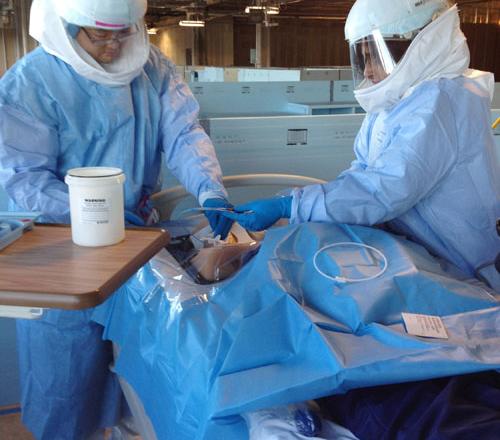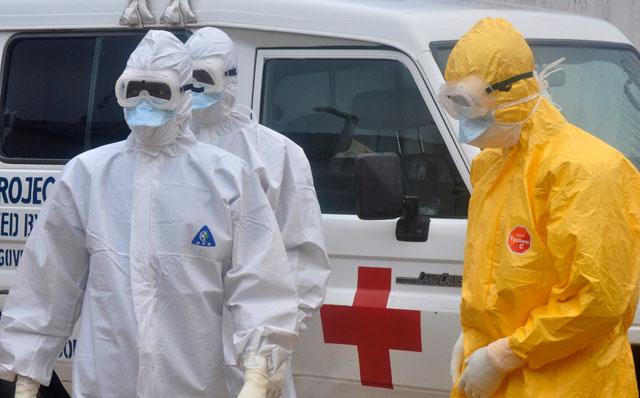You are here
First person diagnosed with Ebola in US dies
By Reuters - Oct 08,2014 - Last updated at Oct 08,2014

DALLAS — A Liberian man who was the first person diagnosed with Ebola in the United States died in a hospital isolation ward on Wednesday and the government ordered extra screenings at five major airports as part of efforts to stop the virus spreading outside of West Africa.
Thomas Eric Duncan, who arrived in the United States in late September from Liberia, had been in critical condition and on a ventilator, the Texas Health Presbyterian Hospital in Dallas giving him an experimental medication to try to keep him alive.
"It is with profound sadness and heartfelt disappointment that we must inform you of the death of Thomas Eric Duncan this morning at 7:51am," hospital spokesman Wendell Watson said in an e-mailed statement.
About 48 people who had direct or indirect contact with Duncan since he arrived on September 20 are being monitored, but none have yet shown any symptoms, according to health officials.
Duncan's case has raised questions about the effectiveness of airport screening and hospital preparedness. The administration of President Barack Obama has been under pressure from lawmakers to enhance screening and even ban flights.
The White House said on Wednesday that extra screening for fever of arriving passengers from West Africa will be carried out at five US airports — New York's John F. Kennedy, Newark Liberty, Washington Dulles, Chicago O'Hare and Hartsfield-Jackson Atlanta.
Duncan became ill after arriving in Dallas to visit family.
He went to the Dallas hospital on September 25, but was initially sent home with antibiotics. His condition worsened, he returned September 28 by ambulance and was diagnosed with Ebola.
"I am in tears. All of us are in tears," Wilfred Smallwood, Duncan's half brother, said from his home in Phoenix, Arizona, after the announcement of Duncan's death.
Duncan's fiancée, Louise Troh, who is being quarantined, wrote in a statement: "His suffering is over. My family is in deep sadness and grief, but we leave him the hands of God."
The hospital has not released details on how it will handle Duncan's body but said it will follow protocols from the US Centers for Disease Control and Prevention (CDC). The CDC and other US health officials say the chances of Ebola spreading in the United States are low.
The current Ebola outbreak, the worst on record, began in March and on Wednesday, the World Health Organisation updated its toll of the disease. WHO said Ebola has killed 3,879 people out of 8,033 cases by the end of October 5, with no evidence that the epidemic was being brought under control in West Africa.
Ebola can take as long as three weeks before its victims show symptoms, at which point the disease becomes contagious. Ebola, which can cause fever, vomiting and diarrhea, spreads through contact with body fluids such as blood or saliva.
While several American patients have been flown to the United States from West Africa for treatment, Duncan was the first person to start showing symptoms on US soil.
A nurse in Spain who treated a priest who worked in West Africa is also infected.
US Secretary of State John Kerry on Wednesday appealed to other governments to do more to help contain the spread of Ebola, urged countries not to shut their borders and told airlines to keep flying to West Africa.
"More countries can and must step up," Kerry said.
Shares of biotech companies linked to the development of treatments against Ebola reacted sharply on Wednesday to Duncan's death. Shares in Chimerix, whose experimental Ebola drug was being administered to Duncan, tumbled 9.5 per cent to $30.08. US-traded shares of Tekmira Pharmaceuticals Corp., whose treatment has been used in other Ebola patients, sharply pared losses, briefly turning positive after having fallen as much as 8.8 per cent earlier.
Questions have been raised on what impact the hospital's decision to discharge Duncan had on his treatment. In animal tests of experimental Ebola drugs, the chance of survival drops the longer it takes to begin treatment.
"You can have the best drug in the world and there is a point where that drug just won't work," said virologist Thomas Geisbert of the University of Texas Medical Branch, who has done pioneering work on Ebola treatments.
"There is a point where the virus has done so much damage you can't recover from it," Geisbert said.
Duncan was able to fly to the United States from Liberia's capital Monrovia because he did not have a fever when screened at the airport and filled out a questionnaire saying he had not been in contact with anyone infected with Ebola. Liberian officials have said that Duncan lied on the questionnaire and had been in contact with a pregnant woman who later died of the disease.
Related Articles
A health worker in Texas at the hospital treating the first person diagnosed with Ebola in the United States has tested positive for the deadly virus, raising fresh worries about the spread of the disease beyond West Africa.
The new US Ebola "czar" starts work on Wednesday as the Obama administration ramps up its response to the potential spread of the virus, and drugmakers started a project to accelerate development of a vaccine and produce millions of doses.
Health workers across Liberia went on strike on Monday to demand danger money to care for the sick at the heart of a raging Ebola epidemic that has already killed dozens of their colleagues.


















